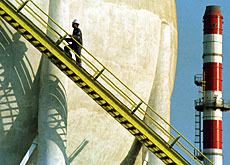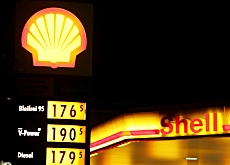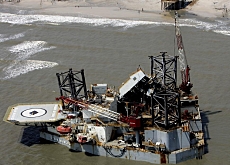Fuel prices reach new heights

The cost of a litre of petrol at the pump has climbed to record levels in Switzerland as the oil market reacts to uncertainty over the situation in the Middle East.
Oil rose above $76 (SFr95.15) a barrel in London on Tuesday, fuelled by fears that the conflict between Israel and Lebanese Hezbollah militants could spread to the rest of the region.
A number of petrol companies announced that the cost of a litre of unleaded or diesel fuel for Swiss drivers would go up SFr0.03.
According to the Touring Club of Switzerland, the country’s biggest automotive association, the average price for unleaded petrol is now SFr1.79, SFr1.83 for premium unleaded, and SFr1.80 for diesel, breaking the previous record from last September.
Most oil companies have admitted that the price hike is due to the Middle East situation.
“It’s a very serious situation and the potential for it to spread is still there,” said Kevin Norrish, oil analyst at Barclays Capital. “The risk is that prices will move higher, and certainly not fall very far.”
Traders fear the violence, triggered when Hezbollah seized two Israeli soldiers and killed eight on July 12, could engulf major regional crude oil producers.
The conflict threatens to suck in Hezbollah’s Syrian and Iranian allies and to inflame the nuclear row between the West and Iran, keeping the heat on prices, analysts say.
As well as threats to supplies, rising demand in the United States, the world’s largest oil consumer, and strong economic growth in China are also supporting oil prices.
Prices in Switzerland have also been affected by other factors, such as higher transport costs along the Rhine and a stronger dollar.
Heating oil
The cost of heating oil has also risen, making purchasers cautious about topping up their tanks before the return of cold weather.
In the Zurich area, prices for 100 litres varied between SFr86.20 and SFr87.70 on Tuesday. Enough to convince consumers to wait another day, although no respite may be on the way.
Max Baumgartner of the Avia federation of independent oil importers says a fall in prices cannot be guaranteed anytime soon. “We can’t give any kind of advice because it would simply be wrong,” he added.
Rolf Hartl, director of the Swiss Oil Union in Zurich, warned that prices could continue to rise if the situation in the Middle East worsens. “There is no foreseeable upper limit at this time,” he said.
According to Hartl, oil prices have reached in real terms a level comparable to the 1979-1980 oil crisis.
Financial experts don’t expect oil prices to affect the economy, which has picked up after years in the doldrums. A recent survey carried out for Credit Suisse, Switzerland’s second-biggest bank, showed that most analysts considered the economic situation good.
One in four said the pace of economic growth would increase in the next six months. Sixty per cent of the analysts said though that inflation would climb along with oil prices.
swissinfo with agencies
In 2004, Switzerland imported 12.66 million tons of crude oil.
Heating oil accounting for a quarter of all energy use that year, while fuel for vehicles was nearly a third.
Total energy use can be divided into three roughly equal parts: households, transport and industry-services.

In compliance with the JTI standards
More: SWI swissinfo.ch certified by the Journalism Trust Initiative



You can find an overview of ongoing debates with our journalists here. Please join us!
If you want to start a conversation about a topic raised in this article or want to report factual errors, email us at english@swissinfo.ch.